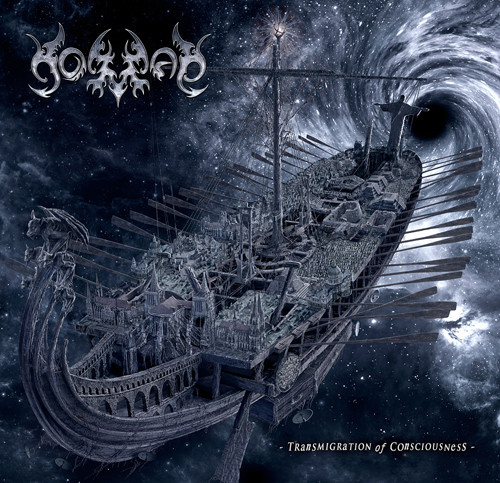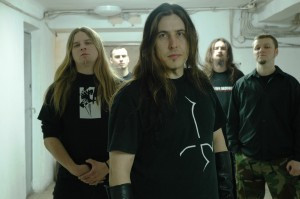
In sporadically sampled reviews of previous releases by Poland’s Nomad, the phrase “brutal death metal” appeared often (along with words like “evil”, “blackened”, and “satanic”). Four years have passed since the band’s last release (The Independence of Observation Choice). In that time, perhaps their musical interests have evolved, because that “brutal death” label doesn’t fit Nomad’s forthcoming album, Transmigration of Consciousness.
What label does fit? Must we afix a label? No, we don’t. Gazing at the stupendous album cover by Michael “Xaay” Loranc, we can instead think of the music that paces the stroke of oarsmen on a giant longship plowing the waves of interstellar gas, emerging from a galactic vortex to carry cities and citadels into an ominous void where no humans have gone before.
Or, to be more prosaic, we could tell you that Transmigration of Consciousness is a kind of death-metal rave, a seamless flow of syncopated rhythms and synth-driven interludes that effectively combines elements of melodic black metal, industrial metal, and tyrannical death.
Or we could just tell you that we’ve near-destroyed our neck muscles repeatedly snapping our rattled heads to this album. (more after the jump . . .)
 First, a word about the sonic design of the album: There are eight songs but 17 tracks, because each song is preceded by a short intro piece that then bleeds into the song that follows, and an album-closing outro that ends with the metallic clang of a massive gate dropping shut.
First, a word about the sonic design of the album: There are eight songs but 17 tracks, because each song is preceded by a short intro piece that then bleeds into the song that follows, and an album-closing outro that ends with the metallic clang of a massive gate dropping shut.
The intros range from synth instrumentals, to busy signals with faint voices speaking in the background, to orchestral interludes, to hypnotic ambient noise, to martial drums and the swell of horns, to carnival-style organs accompanied by cackling laughter and lung-spewing coughs, and more. And each intro fits the song that comes next, in often unexpected ways. Often, the songs themselves bleed right into the next intro. What we said: This album is like one long rave, with few pauses from start to finish.
The signal features of the songs themselves: Urgent, pulsating, rapid-fire riffs that recall the rhythms of industrial metal — repeating, body-commanding, galvanizing at their core; inventive drumwork that vividly accents and adds nuances to the songs well beyond the marking of time; and deep, roaring vocals that herald a kind of demonic majesty.
The music is designed to make you move, and most of it moves at a fast to mid-paced clip. “Abyss of Meditation” is an exception. It’s the slowest pacing on the album, anchored by a repeating rhythm riff, with the variation provided by occasional keyboards and squalling guitar solos. The vocals rise in strident proclamation as the music builds. It’s evil, but mesmerizing.
 There’s more vocal variation in “Raised Irony”, blending higher-register black-metal ice with the titanic roaring, and a third layering of clean vocals. And if you feel like stomping on creatures that annoy you, wait for the monstrous lurch of the closing track, “Four Percent of Hate”.
There’s more vocal variation in “Raised Irony”, blending higher-register black-metal ice with the titanic roaring, and a third layering of clean vocals. And if you feel like stomping on creatures that annoy you, wait for the monstrous lurch of the closing track, “Four Percent of Hate”.
The crank of a thousand oarlocks in motion, the pulsing blood of men at work, the blaze of starscapes in the void, the nagging fear that something waits in the void that you would rather not see. Or we could just say this is more death-metal fun than the law allows. Oh yes, fuck the law.
If the name Nomad sounds familiar, it could be because we included them in a recent MISCELLANY post, where we featured the only song we’d then heard — “Identity With Personification”. It’s still our personal favorite, but we’ll share another taste from the album. This is “Flames of Tomorrow”:
[audio:https://www.nocleansinging.com/wp-content/uploads/2011/02/12.FLAMES-OF-TOMORROW.mp3|titles=Nomad: Flames of Tomorrow]Transmigration of Consciousness will see its worldwide release by Witching Hour productions on March 21.

I think I like this song more than the one from the Miscellany post. The guitars are particularly yummy. It’s what I would imagine falling into the abyss would sound like…
If you liked that one, then you’d probably like “Abyss of Meditation”. The word “abyss” is in the title for a reason . . .